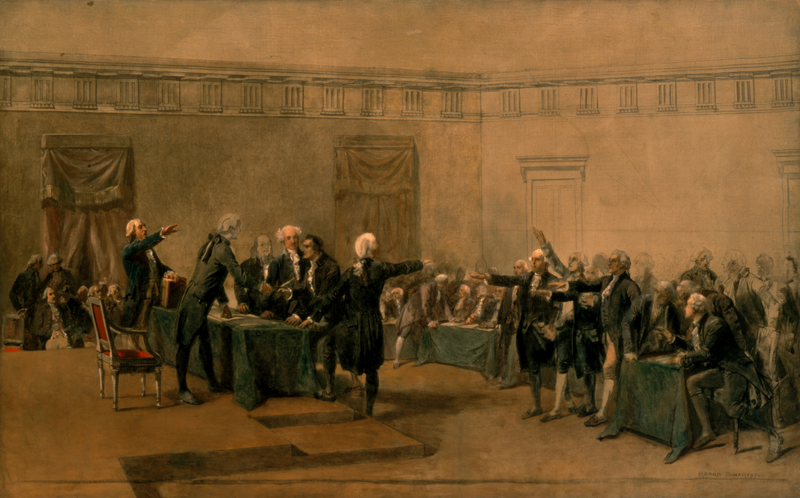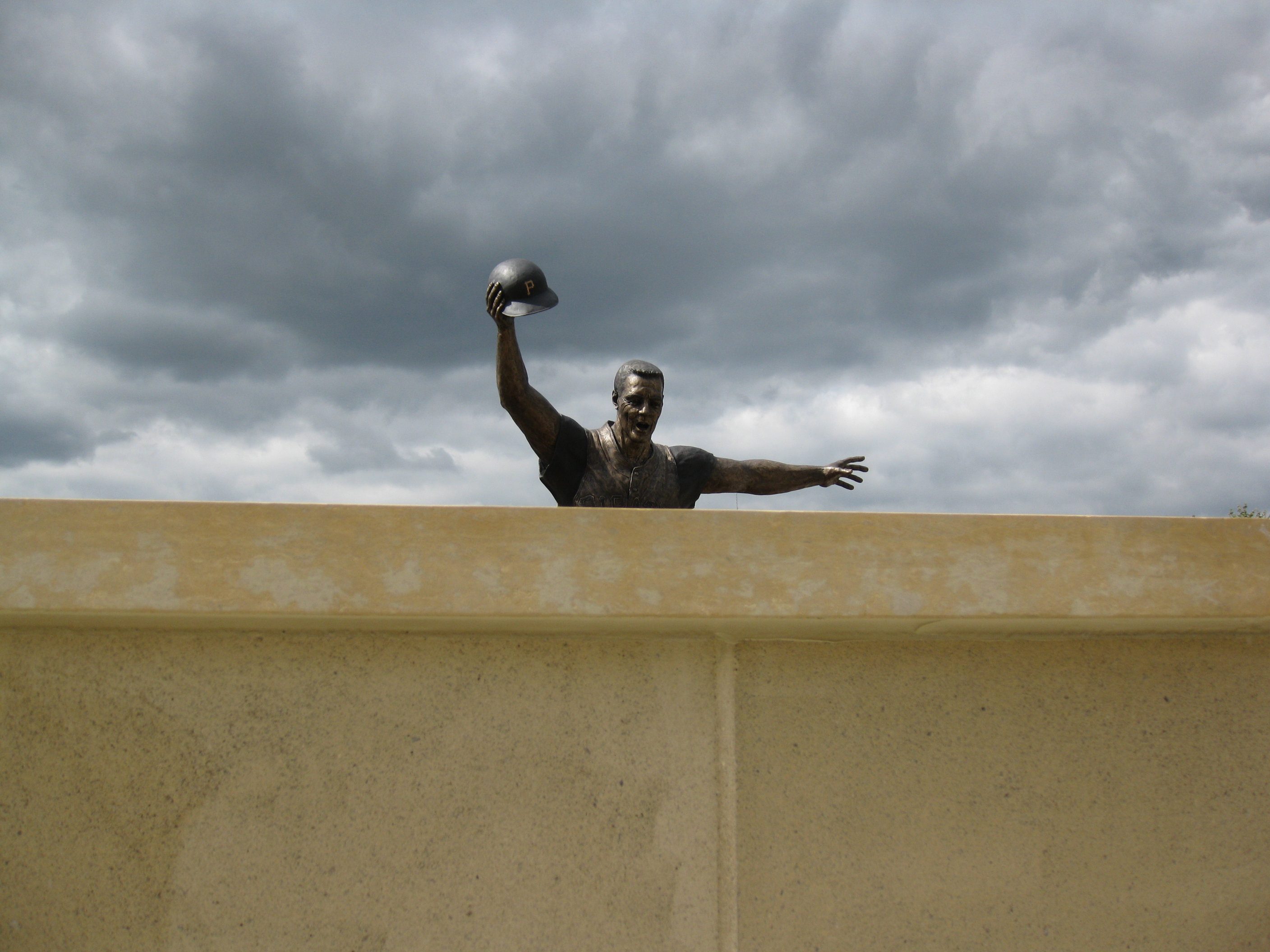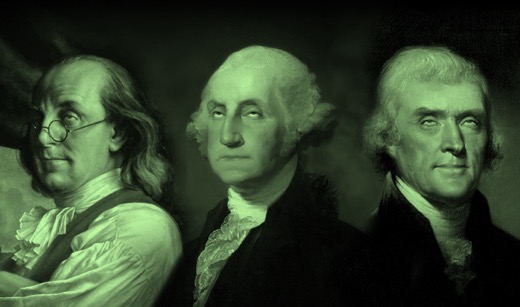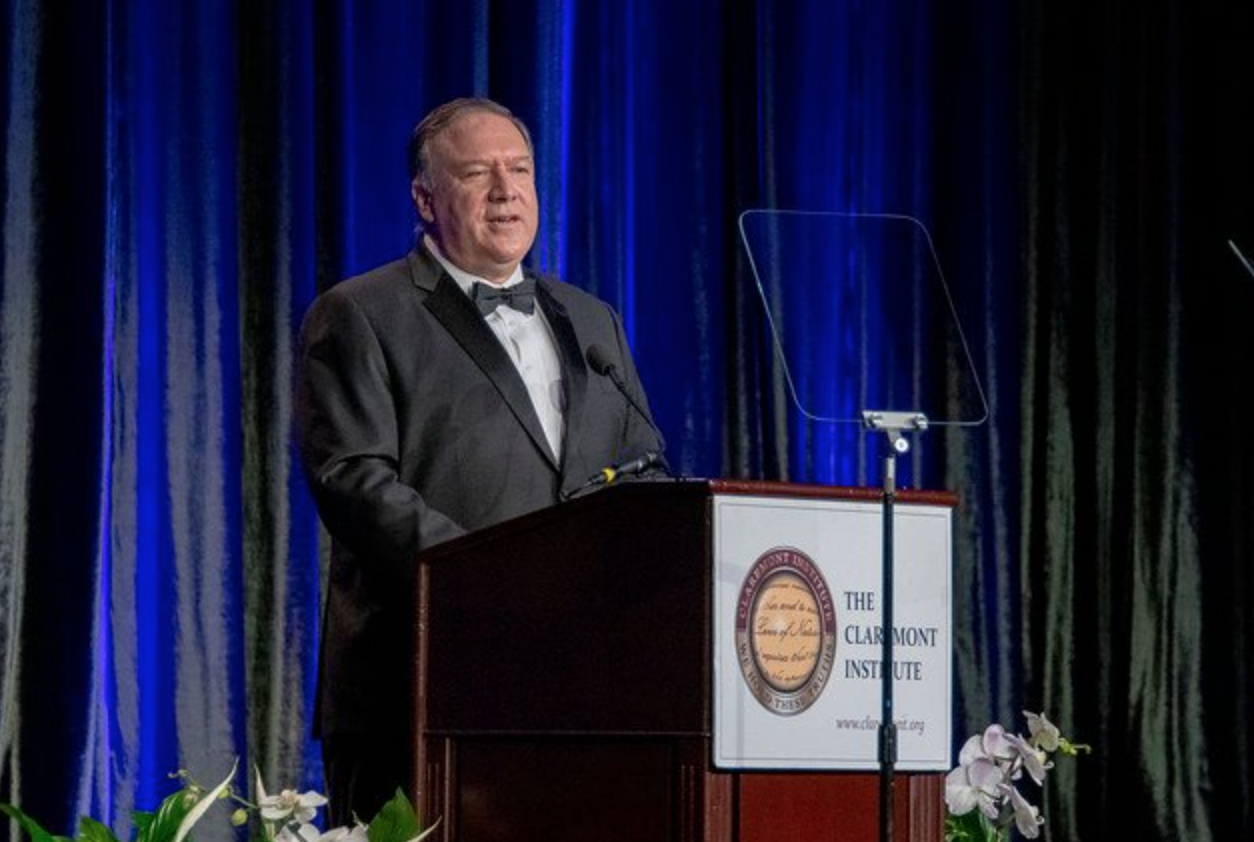Richard Weaver described the mechanism of American decay.
Stop Hating the Puritans
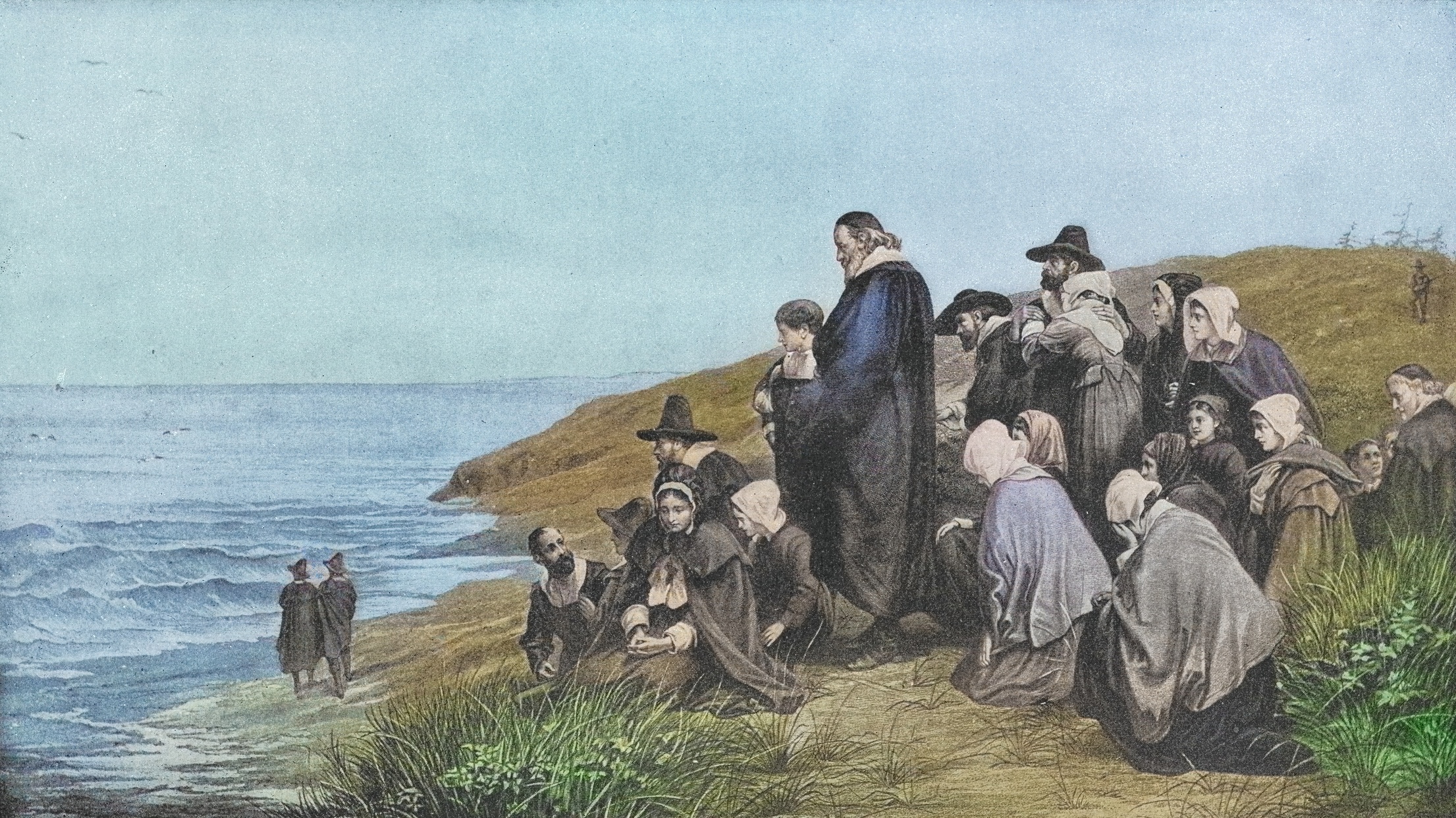
It makes little sense for the Right to chastise our country’s forebears.
Americans used to commemorate, with near religious fervor, the first founding in America: the Puritan founding of the Massachusetts Bay Colony. Only with great effort have liberals convinced us to remove it from our national consciousness. As Gordon Wood has pointed out, in the early republic John Winthrop and William Penn were considered “founders”—Washington, Madison, and Jefferson weren’t on the scene yet.
Americans used to venerate those austere and hardy passengers of the Mayflower and the Arbella. Plymouth and Boston, along with Jamestown in the South—in truth, Virginia was always more low-church and Puritan than most realize—used to be sites of reverence worthy of civic pilgrimage. There was the beginning of America, not as pure economic enterprise, but as politically self-conscious and Christian enterprises, the seed of a “Christian Sparta.” And this impulse transcended class; it was a source of strength for national leadership and imagination.
Henry Cabot Lodge, perhaps the most learned senator ever to grace the halls of Congress, time and again employed his pen in defense of this Puritan heritage. He wrote not simply for the sake of historical record, but to bolster national inspiration and self-confidence. He recognized a universal social need for, and duty to, filial piety.
In “The Puritans,” Lodge recounted the disestablishment of Shintoism (ancestor worship) in Japan. Anglo-Americans had long before discarded such practices, “but the sentiment remains.” Even in Western, formally classless societies, ancestors and their stories provide “arguments” for “mental and moral improvement.” A modest society may not sing its own contemporary praises, but it may do “justice to ancestral deeds and virtue,” and thereby “shine with the mild refulgence of a reflected light.”
Dishonest, sensational history is not mandated by this exercise. But strength is derived from it, nevertheless. In a civilization that in many ways departed so markedly from the Old World, the virtue, piety, and purpose of its first settlers matters no less than that of Virgil’s Rome. Ancestral veneration is, perhaps, more essential to the American way of life than it is on the far side of the pond, where origin is wrapped up in impenetrable Norman and Saxon myth—an amorphous ethnogenesis. Lodge remarked:
[The Puritan] stands out in history as distinctly as a Greek temple on a hilltop against the brightness of the clear twilight sky. It is a stern figure enough, lacking many of the ordinary graces, but it is a manly figure withal, full of strength and force and purpose. He had grave faults, but they were the faults of a strong and not a weak nature, and his virtues were those of a robust man of lofty aims…. We would not barter our descent from him for the pedigree of kings.
Who talks about the Puritans like this anymore? Who talks about America like this anymore? More devastating still, what confident nation doesn’t remember its prime movers this way? That we don’t is an indictment of us.
What if we started doing it again?
At points, when necessary, we have returned to this memory. The last time America faced a Marxian threat and unprecedented domestic unrest, historian Perry Miller embarked on a life-long quest to tell the country’s story. He began with New England, never progressing much further. Miller’s scholarly contribution was a clear-headed, earnest approach to the Puritans. Though himself an atheist alcoholic, he took the Puritans seriously. His polemical mark was made with the insertion of the “city on a hill” metaphor for American history, purpose, and destiny into the national psyche.
The same maneuver is again warranted.
NEOTR
The Left and, to our chagrin, often the Right alike peddle impious caricatures of our national ancestors to score cheap, ahistorical rhetorical points—points only valuable within a liberal-progressive frame.
I am on record more or less embracing Charles Haywood’s tactical strategy known as “No Enemies to the Right” (later changed slightly to “No Enemies on the Right”). But, as Haywood has pointed out, public disagreement that further solidifies the Right is sometimes warranted. This is just such a case. The character and posture I cannot stomach is seeing the Right degrade our national, political, and religious forebears. It deserves confrontation.
Filial piety sometimes must trump provisional goals, because the neglect of such piety portends the defeat of any right-wing coalition in America. Hatred of lineage is a leftist discipline that ensures there exists no culture connected to our forefathers, and no discernable way to preserve our heritage. It is no coincidence that our borders are being breached by foreigners at exactly the same moment that ancestral statues are being ripped down.
For decades it has been standard procedure for the Left to parody the Puritans as tyrannical scolds. This is, of course, because the Puritans stand diametrically opposed to the Left’s enforced equality and libertinism.
More recently, the Right—or what passes for the Right—has fallen into this practice. They analogize between our political enemies and the first New Englanders, a shameful, impious practice in the vein of Nathaniel Hawthorne, who garnered fame off slandering his forefathers. It makes sense for the reigning leftist religious establishment to make this move. But it makes no sense for the dissident Right to invoke the comparison. That is, unless you’re Left adjacent. I mean, libertarian.
Noah Rothman’s latest book, The Rise of the New Puritans, is an ideal example of this trend. His argument rests on the claim that there is a notable connection between the progressive, social justice Left, the new Puritans, and the old Puritans. The cover of New Puritans—a book that cites its own author more than it does primary Puritan sources—comically features a masked man in standard seventeenth century garb in the act of hurling a Molotov cocktail. I emphasize standard seventeenth century clothing because it highlights a central oversight in Rothman’s castigation of the Puritans. As the historian Mark Noll has pointed out, Puritans dressed in gray, drab attire because, well, they were seventeenth century middle-class people. The popular image of the dull and drab Puritan is simply a feature of the period.
If we stretch the definition beyond historical comprehension, the only Puritans Rothman cites directly are Jeremiah Burroughs and Jonathan Edwards, the latter living well beyond the Puritan heyday in New England, the former having never set foot in this country.
Rothman—to be fair, he’s a journalist, not an historian—relies almost entirely on Michael Winship’s Hot Protestants and George McKenna’s The Puritan Origins of American Patriotism. Apart from Winship, a single article by Edmund S. Morgan, and one from Stacy Schiff on, you guessed it, the Salem witch trials, Rothman cites almost no real scholars of Puritanism or sixteenth and seventeenth century Protestantism. Shockingly, Perry Miller is not cited at all.
In nearly 250 pages, the book makes almost no attempt to understand Puritanism beyond the extent necessary to chastise the Left with a cherry-picked construct. Chronology yields causality in his thesis. Cartoons drawn by the Left supply the ammunition—to which, of course, they are impervious anyway.
The “Sinners in the Hands of an Angry God” sermon is the sole Edwards source Rothman cites. In other words, the one “Puritan” thing the average public high schooler is familiar with. The text from Burroughs is a chapter on self-denial from his famous and highly devotional, The Rare Jewel of Christian Contentment. The horror! Of course, intellectual and economic free marketeers cannot be expected to hold the virtues of self-denial and contentment in particularly high regard. Neither sounds like much fun, the virtue (per Rothman) that progressives and Puritans are most guilty of violating. Fun, yes, I seem to remember the Nicomachean Ethics devoting considerable time to that one, preaching against the puritanical “war on decadence, frivolity, and pleasure,” as Rothman puts it.
Puritanism as Bogeyman
The larger point is this: most of what people today dislike about the Puritans applies to Western Christendom. When we denounce the Puritans for the typical reasons—their censoriousness and morality—we undercut ourselves. It was not an impulse unique to our New England forebears to “police morality.” Nor was it a utopian impulse, but a matter of justice to man and God. Societal and moral reform was hardly a Puritan distinctive. As Margo Todd has demonstrated, Elizabethan Puritan movements for renewed public morality were inspired by the humanist Desiderius Erasmus, who never joined the Protestant exodus from Rome.
The reason this all seems so foreign and severe is because modern America is indeed exceptional in the scope of Western Christian history. It is exceptional in its tolerance for diversity and decadence. It is exceptional in the dereliction of moral duty on the part of public authorities in church and state. This exceptionalism that marks our late-stage republic is why things like Christian nationalism, the tenets of which are historically innocuous, scare us. More worrisome is that we lack the fortitude to rebuild what the Puritans began.
I fully endorse Matthew Peterson’s humorous remark that most of us would not have survived early modern Massachusetts. We simply don’t possess the requisite virtue, grit, or determination. We are lesser mortals.
The first settlers of Massachusetts traversed the Atlantic—a more treacherous endeavor than launching to whatever planet Elon wants to take us to—cut a civilization out of rock and thickets while teaching themselves and their children Latin, Greek, and Hebrew. They built our first institutions—churches, colleges, town halls, literature, and law codes—while fending off their outposts from the Pequot warriors. Their stock supplied our nation with generations of a true aristocracy, one that even Catholics miss. They were purveyors of Western civilization. Look at how Perry Miller described the eclectic “intellectual character” of the American Puritan in The New England Mind:
They were first and foremost heirs of Augustine, but also they were among the heirs of Thomas Aquinas and the pupils of Erasmus…. Being an Englishman, on the edge of the Protestant world…he could select what he saw fit from the works of Dutch, German, or Swiss Calvinists, and meanwhile take up from the indigenous traditions, particularly from English legal and political theory, whatever supported his contentions. Like all Protestants, he had revolted against the sway of medieval schoolmen without having discarded the immense accumulation of scholastic thought, which lay before him like an Aztec city before the plunderer. He was still exhilarated by the revival of learning…and he could seize upon the spoils of the heathen to furnish the trophies of Christianity…. Thus the Puritan scholar…ranged at will through the spacious chambers and hoarded treasures of a rich intellectual inheritance.
Hardly the closed-minded, biblicist prude of modern cartoons. Read Puritan theological works and you will find innumerable invocations of the great pagan philosophers, the church fathers, and the medieval scholastics. Read their confessions and laws and you will see a prudential continuance of the English common law.
True, the Puritans were serious about their forms of worship and doctrinal fidelity. But they were not crazed zealots. In one case, it took the authorities of the Massachusetts Bay colony 12 years to discipline a dissenting congregant for his views on baptism. It took that long not because they could not catch him. He was open and defiant. Instead, their pastoral sense demanded patience.
They did not come for unbounded toleration—“religious liberty” as now understood—but to establish a way of life, in both public and private, in full. When a group of anabaptists demanded full suffrage in Massachusetts Bay in the name of religious liberty in 1681, Samuel Willard, a second generation patriarch, answered cooly,
I perceive they are mistaken in the design of our first Planters, whose business was not Toleration; but were professed Enemies of it, and could leave the World professing they died no Libertines. Their business was to settle and secure Religion to Posterity, according to that way which they believed was of God.
A “well-bounded” toleration was prudent and good, but not a religious free-for-all of the kind we endure now.
Forgetting Our Forefathers
In any case, Rothman is not alone on what passes today for the Right in his blaming the Puritans for modern societal ills. He evinces a more widespread problem of historical consciousness and rhetoric on the Left and Right. The Left predictably does so intentionally, but the Right should not play these self-defeating games.
To pick on the most recent example, Joshua Mitchell’s diagnosis of the bastardized theological roots of wokeness is generally excellent. But his attribution of wokeness to Calvinism, Puritanism, or Protestantism as a matter of chronology and pathology is, at times, overdone.
Such is the case in his recent piece at The American Mind, “Contemporary Puritans.” As it stands, the substantive case Mitchell makes is unobjectionable. He is right that education is inescapably religious indoctrination. It is the casual insult of the Puritans that is problematic.
Mitchell knows well his Protestant and American history. What he does not fully appreciate is how the rhetorical move employed plays right into the hands of the Left. Either America’s earliest architects should be repudiated because they were enemies of liberatory levelling, or they must be neutered so that they fit into the mold of modern liberal expectations as harbingers of all that is good and holy in the present regime. Your choice, conservative.
One path requires severing yourself from the past, and the other requires lies. And, as the architects of this conundrum know, both routes negate all inspiration and veneration to be found in America’s socio-political beginnings.
Denouncing any of the American folkways as “preachy and prudish” is un-American, if I may be so bold. If I may be bolder still, it is tactically imprudent—and prudence is, unlike fun, a virtue. Filial piety, a good and necessary consequence of the Fifth Commandment, is not only necessary for national self-confidence, but also just. This, like piety—Rothman has a chapter on that too—is not an invention of the Puritans; it was investigated by the ancients long before. Moreover, and more tactically, the only remedy against the progressive, social justice Left is national self-confidence rooted in ancestral veneration and the embrace of a heritage culture as a socio-political baseline.
Conservatives who try to score cheap points by throwing the likes of Cotton Mather and Samuel Sewall under the bus are tantamount to the iconoclastic mobs ripping down statues of Robert E. Lee and Christopher Columbus. I had thought conservatives were known for their historical consciousness and rootedness, but when insulting the Puritans, they merely solidify the latest advances of the Left.
It is no coincidence that in moments of American vitality, purpose, and cohesion, the Puritan fathers, in particular, have been revered. It used to be venerable to cite the likes of Thomas Hooker, as Calvin Coolidge did, or John Winthrop, as nearly every president since John F. Kennedy has. Even Charlie Brown used to talk about Myles Standish!
Today, Winthrop’s “ultimate inaugural address,” the famous “Model of Christian Charity” haunts liberals because of its substance and legacy. Its vision of a Christian society, weaved together by sinews of mutual dependence, charity, virtue, and duty under governance for the common good of man and justice to God, is indeed scary for the Left (and much of the Right). If Americans recaptured that blueprint who knows what could happen. (If you really want to own the libs, talk about Winthrop, not just his famous lay sermon, but also his Arbitrary Government Described.)
Puritanism as a punchline, epithet, and pejorative should find no comfort on the Right, unless we hate our fathers and, by extension, ourselves. Perhaps we do, and that is why we don’t win. We are captured by leftist—not Puritan—guilt and incentive structures, not to mention a liberal social vision.
The antidote to these socio-political ills is decidedly not joining in the condemnation of their opposite, but in the promotion of the same, not through abstract ideals but through the historic figures that embodied them. E. Digby Baltzell once noted, “What one generation fights for the next generation often revolts from.” It is a right-liberal impulse to denounce the noble stock of heritage America in an effort either to gain approval from the incumbent elite or to assure oneself of the righteousness of liberal priors. In either case, it is time to revolt against it.
The American Mind presents a range of perspectives. Views are writers’ own and do not necessarily represent those of The Claremont Institute.
The American Mind is a publication of the Claremont Institute, a non-profit 501(c)(3) organization, dedicated to restoring the principles of the American Founding to their rightful, preeminent authority in our national life. Interested in supporting our work? Gifts to the Claremont Institute are tax-deductible.
Root, root, root for the electors. If they don't win it's a shame.
United States Secretary of State Mike Pompeo delivered the keynote address at the Claremont Institute's 40th Anniversary Gala as this year's recipient of the Institute's Statesmanship Award.
Combative political journalism lies at the heart of the project to save America.


